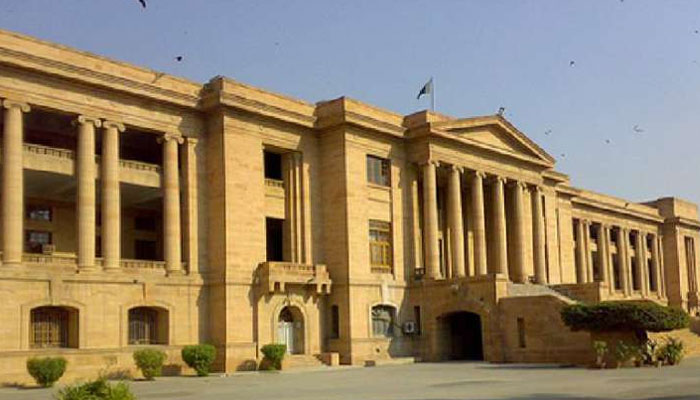SHC reprimands authorities for not publicising helpline to deal with stray dogs
The Sindh High Court (SHC) on Wednesday took exception to the provincial local government department’s failure to not publicise the creation of a helpline service to deal with stray dogs and dog-bite cases in the province.
Hearing a petition for controlling the population of stray dogs and ensuring the availability of free anti-rabies vaccines, a division bench headed by Justice Mohammad Ali Mazhar observed that it had already been directed that a complaint cell and a helpline be set up for registering public complaints for taking prompt action but despite the directions neither was it publicised nor was it forwarded to the Press Information Department for circulating the notification in the print and electronic media.
The high court observed that a section officer of the local government department placed on record a notification with regard to the creation of a helpline with certain terms of reference and a copy of this notification was marked for at least 11 authorities.
The SHC observed that it was a sorry state of affairs that despite a direction to publicise the helpline for general public through print and electronic media, the notification was not forwarded to the information department, which was inefficiency and reckless attitude on part of the local government department. The court issued a show-cause notice to the local government secretary, directing him to reply to why he failed to comply with the court directives.
The high court observed in case of any complaint of a dog-bite incident or presence of dangerous stray dogs, the public may lodge their complaints with the helpline, and the task force secretariat would immediately forward the complaints to the relevant district municipal corporations (DMCs) or cantonments for urgent action.
The SHC also took notice of the non-approval of the PC-I for a programme to fight rabies and check the population of stray dogs at a cost of Rs1,074 million.
An additional secretary of the local government department submitted that a summary had been moved to the chief minister on December 26 for the approval of the PC-1 for the scheme, which was earlier endorsed by the local government, the planning and development board and the finance department, but it was returned with some objections of the planning and development department, according to which the PC-I had not been prepared in a proper format.
The high court observed that it was a very strange objection that the PC-I was prepared by an incompetent person who did not know what the format of PC-I and it seemed nothing but delaying tactics. The bench observed that all the objections by the authorities were frivolous and they were raised only to gain more time.
The court issued notices to the chief secretary, the local government secretary and the planning and development board chairman to appear in person and explain why a matter of public importance was being delayed.
The SHC also took notice of the absence of the local government special secretary, who was also the chairman of the task force constituted to deal with the dog-bite cases and stray dogs. The bench issued a show-cause notice to him for him not complying with the court directives.
The high court had directed the chairman of the task force to appear in person and inform the court what efforts were made by him on the request of the District Municipal Corporation Central to make poison available to kill stray dogs in its jurisdiction.
Regarding medical treatment to the six-year-old boy from Larkana who died after dog-bite, the executive director of the National Institute of Child Health (NICH) submitted a compliance report, mentioning that the child was shifted to the NICH in a very critical condition where he remained under treatment for 27 days. He said the NICH tried their level best to treat the child but he succumbed to the wounds of the dog-bite.
An additional health secretary also filed a report which unequivocally showed that the child was not properly handled and managed by the administration of the Chandka medical hospital. The report said the elements of negligence, carelessness and unprofessionalism could not be ignored. To a court query as whether any action was taken against responsible persons of the hospital, the additional secretary replied that an inquiry committee would be constituted under the health services director general and it would submit its report to the court.
The SHC directed the health secretary to constitute the inquiry committee and notify the names of the members within three days and also intimate the parents of the deceased boy, Husnain Bughio, in writing.
The court also directed the health additional secretary to submit the inquiry report within three weeks and observed that the inquiry committee if required may also summon the NICH executive director for his opinion and expertise.
Representatives of the cantonment boards submitted their replies to the court, mentioning that they had already established dog control cells and they were making all possible efforts in the larger public interest against the stray dogs to control the dog-bite incident in their respective territorial jurisdictions. The high court directed the cantonment boards and the DMCs to continue their campaign against stray dogs and submit compliance reports.
The court also directed the Sindh government and local bodies’ authorities to continue action against the stray dogs in the province and adjourned the hearing till February 19.
Petitioner Advocate M Tariq Mansoor had submitted in the petition that Sindh Health Minister Dr Azra Pechuho gave a statement before the provincial assembly that more than 92,000 dog-bite cases had been reported across Sindh during the year that ended on June 30, 2019, and there was a shortage of anti-rabies vaccine due to the ongoing tension with India and the closure of a Chinese company’s operations.
The petitioner had maintained that dog-bite incidents had been worsening day by day due to the failure of the provincial and local administration to cope with the situation as neither were the stray dogs detained nor was the anti-rabies vaccine available in hospitals.
-
 Rihanna To Announce Music Comeback And UK Stadium Shows
Rihanna To Announce Music Comeback And UK Stadium Shows -
 Tish Cyrus Calls Post-divorce Period 'roughest' Time Of Her Life
Tish Cyrus Calls Post-divorce Period 'roughest' Time Of Her Life -
 Prince Harry Turns To Hands-on Fatherhood As ‘crippling Social Anxiety’ Get Choke Hold
Prince Harry Turns To Hands-on Fatherhood As ‘crippling Social Anxiety’ Get Choke Hold -
 Pete Davidson Launches Talk Show From His Garage
Pete Davidson Launches Talk Show From His Garage -
 US To Suspend Immigrant Visa Processing For 75 Countries: Know All Details
US To Suspend Immigrant Visa Processing For 75 Countries: Know All Details -
 Ariana Madix And Tom Sandoval Settle Legal Dispute
Ariana Madix And Tom Sandoval Settle Legal Dispute -
 Travis, Jason Kelce React To Mom Donna's 'Traitors' Stint
Travis, Jason Kelce React To Mom Donna's 'Traitors' Stint -
 Justin Baldoni Says He Held A Prayer Gathering Before Deposition In Blake Lively Case
Justin Baldoni Says He Held A Prayer Gathering Before Deposition In Blake Lively Case -
 Enjoy Lee, Takaichi’s Viral Jamming Session, In Case You Missed It
Enjoy Lee, Takaichi’s Viral Jamming Session, In Case You Missed It -
 MrBeast Admits He's Unsure About Having Kids - Here's Why
MrBeast Admits He's Unsure About Having Kids - Here's Why -
 Prince Harry Carries Heartbreaking Hope For Archie, Lilibet Who Are Not Sharing In Their Royal Heritage
Prince Harry Carries Heartbreaking Hope For Archie, Lilibet Who Are Not Sharing In Their Royal Heritage -
 Tom Brady Breaks Silence On 'personal Life' After Alix Earle Rumors
Tom Brady Breaks Silence On 'personal Life' After Alix Earle Rumors -
 Guy Fieri Drops Health Update After Accident That Left Him In A Wheelchair
Guy Fieri Drops Health Update After Accident That Left Him In A Wheelchair -
 Experts Weigh In: Is Prince Harry Operating A PR Stunt Or The Invictus Games’
Experts Weigh In: Is Prince Harry Operating A PR Stunt Or The Invictus Games’ -
 Inside Kate Middleton’s Biography With Secrets From St Andrews To Harry & Meghan’s Royal Exit
Inside Kate Middleton’s Biography With Secrets From St Andrews To Harry & Meghan’s Royal Exit -
 Paul Mescal Reveals Shocking Move He Made In 'Hamnet'
Paul Mescal Reveals Shocking Move He Made In 'Hamnet'




